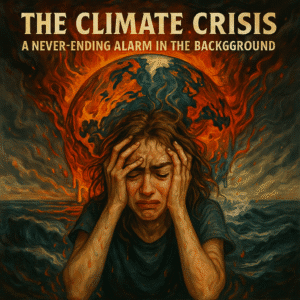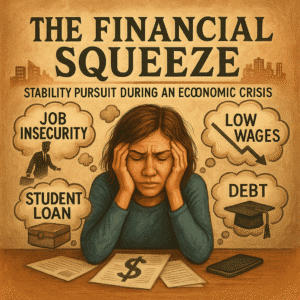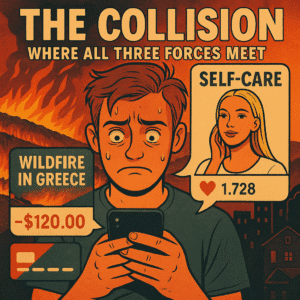The Climate Crisis: A Never-Ending Alarm in the Background
 The planet is burning, melting, and flooding—and we are aware of it. Unlike previous generations, today’s youth and young adults grow up not with the promise of progress, but with the looming shadow of irreversible climate collapse. The psychological term “eco-anxiety,” which was once a niche concern, is now mainstream. Guilt about their carbon footprints, anxiety over natural calamities, and powerlessness in the face of sluggish policies are just a few factors that ring in people’s minds. Surpassing the notion of mental health-related policies, the shift in the global climate automatically puts stress universally.
The planet is burning, melting, and flooding—and we are aware of it. Unlike previous generations, today’s youth and young adults grow up not with the promise of progress, but with the looming shadow of irreversible climate collapse. The psychological term “eco-anxiety,” which was once a niche concern, is now mainstream. Guilt about their carbon footprints, anxiety over natural calamities, and powerlessness in the face of sluggish policies are just a few factors that ring in people’s minds. Surpassing the notion of mental health-related policies, the shift in the global climate automatically puts stress universally.
The Mental Toll:
The constant stress caused by climate impacts news can either numb or freeze one’s ability to make decisions. Doomist, coupled with fatalism, can lead to disengagement and depression. Most “youth” especially report feeling anxious as to whether they want to have children or construct a long-term future.
The Financial Squeeze: Stability Pursuit During an Economic Crisis
 People are concerned with their finances even when we are in one of the most advanced economic periods in history. Job opportunities tend to be scarce, the cost of living is on an upward trend, and salaries have stopped increasing. Financial stress is no longer just about poverty—it’s middle-class, educated, and fully employed people wondering how they’ll ever retire, afford healthcare, or own a home. Unlike past generations who believed hard work would lead to security, today’s workers face “precarity anxiety”—a chronic sense of instability even when they’re doing everything “right.”
People are concerned with their finances even when we are in one of the most advanced economic periods in history. Job opportunities tend to be scarce, the cost of living is on an upward trend, and salaries have stopped increasing. Financial stress is no longer just about poverty—it’s middle-class, educated, and fully employed people wondering how they’ll ever retire, afford healthcare, or own a home. Unlike past generations who believed hard work would lead to security, today’s workers face “precarity anxiety”—a chronic sense of instability even when they’re doing everything “right.”
The Mental Toll:
In particular, student loans can contribute to debt and are a major source of stress.
Balance between life and work can be hard to achieve for gig economy workers, which exposes them to increased burnout. Health, relationships, self-image, and worth, and many more aspects of life can be further impaired due to the mounting financial stress.
Social Media: The New Nervous System
 We don’t just use social media—we live through it. What started as a tool for connection has become a mirror that distorts reality and magnifies insecurity. Platforms feed us a carefully curated feed of other people’s best moments, filtered beauty, and performative activism. Meanwhile, algorithms exploit our attention spans and reward outrage, comparison, and validation-seeking. You’re not mistaken—social media genuinely alters the brain’s wiring. The endless scrolling of social media serves as a dopamine feedback loop, making us addicted to ‘likes’, while widespread exposure to conflict and beauty standards, as well as sensationalized trauma, ffurther desensitizes and overstimulatesus.
We don’t just use social media—we live through it. What started as a tool for connection has become a mirror that distorts reality and magnifies insecurity. Platforms feed us a carefully curated feed of other people’s best moments, filtered beauty, and performative activism. Meanwhile, algorithms exploit our attention spans and reward outrage, comparison, and validation-seeking. You’re not mistaken—social media genuinely alters the brain’s wiring. The endless scrolling of social media serves as a dopamine feedback loop, making us addicted to ‘likes’, while widespread exposure to conflict and beauty standards, as well as sensationalized trauma, ffurther desensitizes and overstimulatesus.
The Mental Toll:
The most commonly reported health issues are anxiety, depression, and a sense of alienation, particularly prevalent among teenagers. Encumbered by superficial growth, straining focus leads to a loss of attention and chronic distraction. Comparison-based virtual authenticity results in a loss of one’s grounded self-image
● Validation poses as critical concern.
● Accept
● Dismiss
The Collision: Where All Three Forces Meet
 It’s not just that we’re anxious about the environment, or about money, or about likes. It’s that all these pressures now collide, creating a perfect storm of psychological unrest.
It’s not just that we’re anxious about the environment, or about money, or about likes. It’s that all these pressures now collide, creating a perfect storm of psychological unrest.
Imagine doom-scrolling a wildfire in Greece while checking your bank account after rent was auto-deducted, only to be met with a flawless influencer talking about self-care. The dissonance between what we experience and what we’re told to feel leads to emotional burnout, apathy, or worse—existential dread. So… What Now? It’s tempting to unplug and retreat, but the goal isn’t to escape reality—it’s to understand it. Identifying the problem is the first step towards becoming stronger and resilient. It can be very overwhelming dealing with problems, but knowing what the problem is makes it slightly easier. The list below will aid you in knowing where to start. Put a name to your anxiety. Is it eco-anxiety? Financial fear? Comparison fatigue? For dealing effectively, it
helps to manage through. – Follow accounts and media that aid and educate without overwhelming you. Seek balance, not blissful ignorance. Hand nature a helping hand – whether it’s through budgeting, voting, or volunteering, every little bit helps soothe those feelings of helplessness. Encourage friends, family, or even a therapist. These people in your life do more than you think, as they aid
digital disconnection.
Final Thoughts
We are in extraordinary times, and the world has gone crazy, and the biggest thots in the world are no exception. After all, anxiety — it’s not the opposite of good health. So, what is it? It’s a signal — one that says that we are here, and that our attention and effort are engaged in trying to understand a world that feels perilously unstable. With this context, the problem is not how to silence anxiety, but how to sensibly respond to it without exhausting oneself. Here, awareness of an uneasy country is the soldier that continues to stave off the loa,— that being, in this case, a loadless, weightless state.

